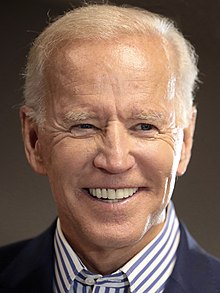On April 14, 2020, President Obama endorsed Joe Biden For President. He noted Biden’s leadership on health care, climate change, and the 2008 recovery, and said that he believes that Biden is the person who can heal the country in the wake of the COVID-19 outbreak. With President Obama on our team, we’re going to unite our party and restore the soul of the nation. Together, we will defeat Donald Trump.
Please watch the video below of President Barack Obama endorses Joe Biden For President:
Who is Joe Biden?
Based on Wikipedia: Joe Biden, Joseph Robinette Biden Jr. (/ˌrɒbɪˈnɛt ˈbaɪdən/;[1] born November 20, 1942) is an American politician who served as the 47th vice president of the United States from 2009 to 2017 and represented Delaware in the U.S. Senate from 1973 to 2009. A member of the Democratic Party, Biden is the presumptive Democratic nominee for president in the 2020 election. He unsuccessfully sought the Democratic presidential nomination in 1988 and in 2008.
Biden was raised in Scranton, Pennsylvania, and New Castle County, Delaware. He studied at the University of Delaware before receiving his law degree from Syracuse University.[2] He became a lawyer in 1969 and was elected to the New Castle County Council in 1970. He was elected to the U.S. Senate from Delaware in 1972 when he became the sixth-youngest senator in American history. Biden was reelected six times and was the fourth-most senior senator when he resigned to assume the vice presidency in 2009.
As a senator, Biden was a longtime member and eventually chairman of the Foreign Relations Committee. He opposed the Gulf War in 1991 but advocated for U.S. and NATO intervention in the Bosnian War in 1994 and 1995, expanding NATO in the 1990s, and the 1999 bombing of Serbia during the Kosovo War. He argued and voted for the resolution authorizing the Iraq War in 2002 but opposed the surge of U.S. troops in 2007. He has also served as chairman of the Senate Judiciary Committee, dealing with issues related to drug policy, crime prevention, and civil liberties, as well as the contentious U.S. Supreme Court nominations of Robert Bork and Clarence Thomas. Biden led the efforts to pass the Violent Crime Control and Law Enforcement Act and the Violence Against Women Act.
In 2008, Biden was the running mate of Democratic presidential nominee Barack Obama. As vice president, he oversaw infrastructure spending to counteract the Great Recession and helped formulate U.S. policy toward Iraq through the withdrawal of U.S. troops in 2011. His negotiations with congressional Republicans helped the Obama administration pass legislation including the Tax Relief, Unemployment Insurance Reauthorization, and Job Creation Act of 2010, which resolved a taxation deadlock; the Budget Control Act of 2011, which resolved that year's debt ceiling crisis; and the American Taxpayer Relief Act of 2012, which addressed the impending fiscal cliff. Obama and Biden were reelected in 2012.
In October 2015, after months of speculation, Biden announced he would not seek the presidency in the 2016 election. In January 2017, Obama awarded Biden the Presidential Medal of Freedom with distinction.[3] After completing his second term as vice president, Biden joined the faculty of the University of Pennsylvania, where he was named the Benjamin Franklin Professor of Presidential Practice.[4] He announced his 2020 candidacy for president on April 25, 2019, joining a large field of Democratic candidates pursuing the party nomination.[5] Despite poor showings in the first three state contests, Biden won the South Carolina primary decisively, and several center-left candidates dropped out of the race and endorsed him before Super Tuesday. Biden went on to win 18 of the next 26 contests. With the suspension of the campaign of Bernie Sanders on April 8, 2020, Biden became the Democratic Party's presumptive nominee for the presidential election.[6]

